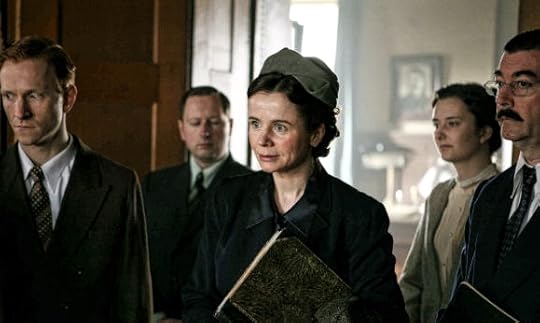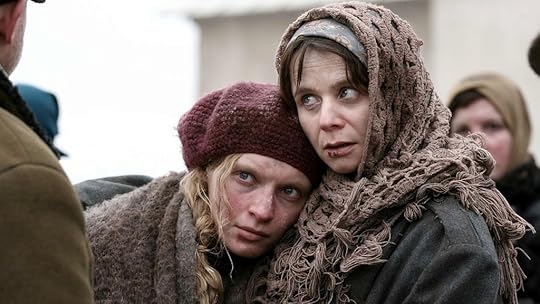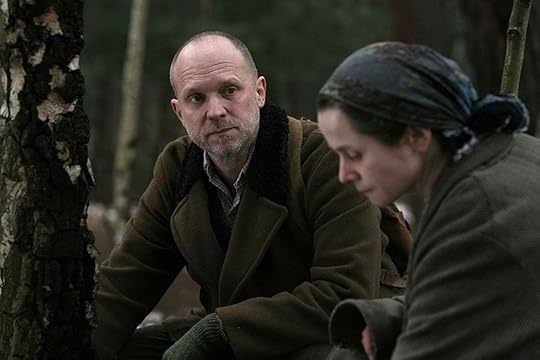What do you think?
Rate this book


418 pages, Paperback
Published November 4, 2002











I do not want to sound like a heroine or a martyr. I am very far from thinking that my refusal to sign their lying records was due to any special courage on my part. Nor do I judge those comrades who, tortured beyond endurance, signed whatever was put before them.There's a certain phenomenon that seems to be less common these days, or perhaps is simply more derided and/or denormalized, amongst self-professed cultural connoisseurs: the -phile. Anglo, Franco, Asia getting its own specifically othering title under the name of "Orientalist", all those crop up every so often amongst nonfictions and even fictions to evoke a feeling of devotion/obsession with a country/culture/populace external to that of one's origins. Less often, I've come across a form known as "Russophile" and at the end of this book, I can see how one could be struck, as if by lightning, and subsequently set upon a path in almost worship of such a huge, foreboding landscape and its historical figures both real and fiction, sprung straight from the Opera or the Ballet. This may be a wildly digressive proclamation to make in view of the solitary confinements and the gulags of these pages, but Eugenia Semyonovna Ginzburg recites the entirety of Eugene Onegin on prison trains and commiserates with imposter Tsarina's in the same buildings that once incarcerated enemies of Tsar Alexander II, until all the events of the years ripped away from her attest, with blood and bone and agony, that Stalin was not capable of executing Russian culture by firing squad. It is still heartbreaking to wonder, though, what could have been, had all that this book contained not spawned into harrowing, idiotic existence on the eve of 1939, the dawn of World War II and all the violations that Ginzburg, in myany ways, had been witnessing for two full years, with sixteen more to go.
On the march back, numbers of them had died like—I was going to say "like flies," but at Kolyma it was truer to say that flies died like people.
May I never experience all that it is possible to get used to.Some may be wondering why, despite the five stars, I've knocked off a half up above. It's because, in the midst of all the comradery birthed in the face of abject fear and looming annihilation, Ginzburg managed to hang onto in spots antisemitism, classicism (in a socialist state, but honestly, that's no surprise if people haven't done the anti-bigotry work in all realms instead of one), and ableism. It's blink and you'll miss it at times and does alleviate near the end when Ginzburg is forced into close quarters with several of her maligned demographics, but it was immensely jarring to go less than 20 pages in and be confronted with "Who's the red-haired Motele [(A common Jewish first name)]...while he exercised his Talmudic subtlety", and even more baffling upon my looking up the author's bio and finding out that her father was Jewish. I don't expect her to be a saint, but as marvelous a document as this is, it's hard to sympathize with, and even glory in it at times, when the author falls into so many of the traps that her tormentors fell into that led directly to her persecution in the first place. Beyond this, this work is an extraordinarily full bodied testimony that interweaves grueling treks made by skeletons riddled with scurvy and diarrhea and with recitations of Tsvetayeva and Blok, to the point that I noted down several reading recommendations and have a new urgency to my desire to read Pasternak's Doctor Zhivago. Yes, my heart leapt into my throat with every starvation and execution, but to succumb momentarily to the language of stereotype, Russia and its people are really something else at times, and so to is their culture. I still plan on reading what books of Solzhenitsyn I have on hand about the subject of the gulags, but after this, it's hard not to wonder whether he may be redundant, or even not measure up.
Strange to say, one could obtain freely in prison a number of books which had long since been withdrawn from public libraries.This work was a surprise in some ways, but then again, every genuine five star awarded is a surprise at this stage of my reading career, and two in about one week is astonishing, to say the least. I simply have to give a magnificent work that records the wounds struck into the body of a people its due, a body that, for all intents and purposes, is still rising from the ashes today. On my side of the ocean, I'd like to think that Trump is no Stalin, but there are concentration camps on US soil, and just because the topic has mostly passed out of the media focus doesn't mean that there aren't still children dying from treatable diseases within barbed wire compounds, much as Anne Frank died of typhus long ago in Bergen-Belsen. I'm not the on in solitary confinement, but the one passing just beyond the shuttered windows and desperate tapping on prison walls. It therefore falls to me to do something.
What a good thing for us that in modern times all processes have been speeded up. Those who devised and carried out the operations of 1937 found that it was simply not practical to keep such multitudes in prison for ten or twenty years: it was inconsistent with the tempo of the age and with its economy. Things were moving about ten times as fast as in the old days; and thus, instead of Vera Figner's twenty years in solitary, I served two.
"Do not speak for all of us," said someone from the top bunk.
"Naturally," Tamara went on, "I do not include those who are willing not only to knuckle under, but to justify it all in the bargain."
"And to produce theoretical arguments why it must be so,"[...]
"I repeat: I am not addressing all of you, but only those who have not lost their human dignity and self-respect."